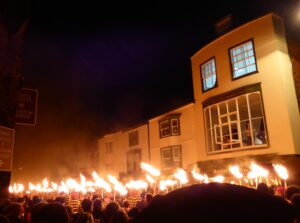
In his excellent series on world religions, ‘Living with the Gods’, Neil McGregor reminds us that participation in a festival binds us into a recognition of past, present and future. It’s a phrase that got me thinking. In some ways, I feel that everyday living is about past, present and future, but I recognise that sometimes we live for the present and need a reminder of the importance of the long-term view. In this, I appreciate the way in which he conflates past and future. I love a good festival and this year I have been lucky enough to participate in two, very special, events: Up Helly Aa and the Lewes Bonfire Celebration. Of course, I was not an actual ‘player’, in both cases the right to dress up and join the parade is a privilege accorded after years of support. But, in addition to watching, I was able, in both cases, to attend local events: one of the Halls in Shetland; and a family ‘Open House’ through the evening in Lewes. In this way, I became one of those who celebrated.
I had a wonderful time in both places, but the experience was deeper than having fun. Unexpected emotions came to the fore and still linger. Both events are strongly rooted in the past, but not quite in the ways you might imagine. Both events challenge our sense of ourselves and our position in the world.
In both places, the players include those who behave in ways that challenge contemporary social boundaries. They have, on occasion, been criticised for this. Yet, it is a common issue when people get together to party, wherever they are, and I don’t find it a problem. I’d be sorry to see all celebrations reduced to bland tableaux that conform to the political ideals of the day. Surely the point of events like this is that they provide an opportunity to defy established norms and mock the institutions of power. In doing so they give people a voice, but, perhaps more importantly, they force us to address our preconceptions and beliefs. In this way, they make us look to the future. What sort of world have we created, what sort of world do we want to inhabit?
Often, the events remembered are actually quite difficult. I’m not sure that the local communities of northern Britain would have reacted with quite such merriment on seeing the approaching fires of Norse marauders in the tenth century. The religious prosecutions of the sixteenth century (and many other centuries), were not a happy time. Even the birth of a baby in Judea over two thousand years ago came at a time of political duress. As much as anything, we commemorate our ability to come through hardship and pain. The celebrations mark freedom and strength.
In both places, the festivities are actually more recent than the centuries they portray, though this is not a criticism either. Celebrations come and go, they may lose popularity before being re-invented and even reshaped for a modern world, that re-invention is one of the threads that ties them back to the past.
At this time of year, when so many are caught up into the days of celebrating Christmas and New Year we should not need to be reminded of the ways in which the festivities mean so many different things to different people, and indeed of the way in which they have changed down the years. Whether we go with the overall flow, or invent our own little rituals, we can all remember very different Christmases in years gone by. Whether we worship specific gods in specific places, or just try to do right by the world, we still want to be a part of it.
Festivals like this bring us together. We might be challenged by the actions of other people. We might be sceptical about the authenticity of the detail. We might be doubtful about historicity. We might not even have the wherewithal to join in fully. That is all good. It makes us think: to reassess our place in the world today; to appreciate our communities; value the past; and move with confidence into the future.
You must be logged in to post a comment.